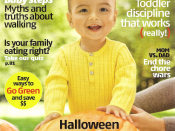Parenting: In reality, parenting doesn't have an age limit
As the society is burgeoning, people are becoming more sexually interactive, which leads them to become young parents. Teen pregnancy statistics show that about 820,000 teens become pregnant each year; it means that 34 percent of teenagers have at least one pregnancy before they turn 20. There are also people in the world who wait for the right time to start a family; those types of people are usually people who marry at an older age. Articles show that older people truly love being parents at an older age and they believe that being a parent at an older age is actually helping the world by them providing useful knowledge to their child. Moreover, deaths and parents leaving their children behind are incidents in people's life that can lead to unexpected parenting. These two factors contribute to an unlimited age in parenting because people at any age can take place as a parent for their lost ones and they can take place as a foster parent.
Any age doesn't literally mean any age; it means that you must be able to take care of yourself. Parenting doesn't depend on the age; it depends on the willingness to accept the responsibilities to raise a child into a grown adult. People can be parents starting from early ages when they have responsibilities and commitments to become role models. Parenting lasts
for a lifetime, and it doesn't matter how old you are; if you're still devoted to care for and look out for someone, then age doesn't matter.
Life is always unexpected when it comes to losing someone you love. If that someone is a parent, his/her child could be in a desperate need for a new parent. In his book Making Toast, Roger Rosenblatt loses his one and only daughter, Amy, due to an unexpected situation while she was running on her treadmill. After her death, he and his wife moved out of their beloved house into their son-in-law's house in order to help take care of their grandchildren. They technically become their grandchildren's parents, providing them with love and support. Although they are both old, in their 60s-70s, they both feel like they are doing the right thing by taking Amy's place as her children's "parents". His wife, Ginny said:
I think my whole life has led up to this moment, she tells me. When Carl was born, I felt I was coming into my own, to be a mother. It's what I love to do. I know who I amâ¦I'm comfortable doing this. (Rosenblatt 37-38)
Rosenblatt quotes his wife's comments about being a parent in his book to provide an insight that parents need to love being parents, and that it doesn't matter what age they are as long as they are able to be pleased about their commitment to their duty as parents.
Another factor is when parents leave their child behind, causing her/him to become an orphan. Most likely, people who adopt these orphans are all different ages. They usually adopt these children when they are unable to have children of their own. Before these parents could adopt the children, they get background checks and questions to determine if they would be loving parents. Rosenblatt talked about a similar situation in his book:
He had been born prematurely with multiple developmental problemsâ¦The child had been neglected by his mother, but his foster mother, whom Amy respected,
had been diligent about checkupsâ¦She took it very hard when the child died. She had a great sixth sense, but she thought it had failed her. She blamed herself. (Rosenblatt 79)
Rosenblatt is making a point here in which parents must be responsible for their child no matter what situation they are in, hence the foster mom blaming herself on her child's death. He also pointed out that foster moms need to be caring by including that fact that Amy respected the lady.
Moreover, according to an article from Herald Sun News, older parents get benefits. Associate professor Catherine McMahon from the Centre for Emotional Health found that older mothers were more spirited, reported their partner as being less controlling, and had less anxiety and depression during pregnancy. She also stated that "Parenting is difficult and challenging and requires ongoing problem solving. Due to greater life experience, older parents may be more able to respond flexibly to these challenges."(Baker) Most people tend to think that as they become older, they won't be able to have enough energy to take care of children, but these benefits listed by Dr. McMahon proves them wrong. Moms were also interviewed about this topic and a lady name Marella Jackman agreed with Dr. McMahon's point. She stated that "I have more patience as an older mum."(Baker) It's the quality of parenting, rather than age that influences the children to become successful.
In another source, Rick Parfitt and Lyndsay Parfitt also love being older parents. Rick said "I thoroughly recommend late fatherhood. It's put a spring in my step. No doubt there will be some people who disapprove of a man fathering a child in his 60s but the advantages far outweigh the disadvantages. I've grown up and realize what the most important things in life are - love, good health and family. I understand what being a dad really means. It's showing your love through sleepless nights, changing nappies and altering your life so you can be there for the kids." (Carpenter, Nicholas).Rick's statement demonstrates his willingness to be a father as long as he is determined to make his family happy. Love is what conquers all in being a parent.
Certainly, people who are pregnant at young ages are looked down upon by older parents. Adults think that in our generation, teens are becoming more immature and they are not using correct protection. Statistics say that 79 percent of teenagers who become pregnant are unmarried and 80 percent of teenage pregnancies are unintended. These statistics show unacceptable behavior to adults on teen pregnancy. Teens also usually end up having abortions. About a quarter of all teenage pregnancies in the U.S. end in abortion. While it is true that abortions are considered inhumane to many people, it doesn't necessarily mean that the choice is made on purpose. Teens may choose to have an abortion because they feel pressured and have concerns about how having a baby would ruin important personal goals, such as completing their education; they worry about the financial responsibilities related with parenthood; or they feel that they are not mature enough to become a parent.
In the Pregnancy Birth and beyond website, there are stories of many successful teen moms are living happily with their child. One of the stories is about Liz Mason, a girl who got pregnant at the age of 16. She said "Once I decided I put my heart and soul into making something good of my decision. I quit smoking and drinking, left my private school, and took on the daunting task of telling my family and friends."(Mason) Mason made the right choice because she cared about her child and wants him/her to be healthy. Not all teens are self-centered and only care about their life. Mason demonstrates that teens can be a parent as long as they are willing to sacrifice their dreams to become committed parents.
Overall, parents don't need to be judged by their age. Anyone at any age can be parents
as long as they have the characteristics of loyalty, dedication and hope. Teens can be made over into parents; grandparents can be made over into parents. People who think parents do have a specific age limit should reconsider that idea because think about it, taking care of a dog is still considered "parenting" because we, the owner, are giving the dog love and care and that's the basic ingredients on being a parent. Parenting isn't a restricting job; anyone who is willing to take care of children can become parents at any age.
Works Cited
Rosenblatt, Roger. Making Toast. New York: Harpercollins, 2010. Print.
Bowlby, Rachel. "Birth stories: how science is changing parenthood." New Statesman [1996] 9 Aug. 2013: 48+. General Reference Center GOLD. Web. 17 Dec. 2013.
Smith, Julianne. "Parenting." Library Journal 15 Nov. 2012: 73+. General Reference Center GOLD. Web. 17 Dec. 2013.
Child Trends. N.p., n.d. Web. 6 Jan. 2014.
Express. Julie Carpenter and Sadie Nicholas, 11 Apr. 2012. Web. 26 Dec. 2013.
Forbes. N.p., n.d. Web. 27 Dec. 2013.
Herald Sun. Jordan Baker, 20 Jan. 2013. Web. 29 Dec. 2013.
Huffington Post. Ann Brenoff, n.d. Web. 6 Jan. 2014.
Pregnancy Birth and Beyond. Liz Mason, n.d. Web. 29 Dec. 2013.
Teen Help. N.p., n.d. Web. 6 Jan. 2014.
The Telegraph. Telegraph Media Group, n.d. Web. 26 Dec. 2013.


